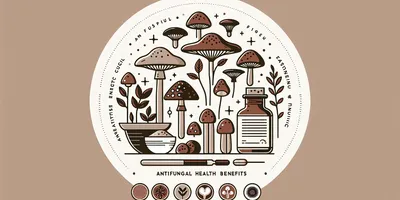Clustered Coral Benefits (Ramaria botrytis)
Clustered Coral (Ramaria botrytis) is an edible mushroom and medicinal mushroom.

Provides Anti-Inflammatory Benefits
Chronic inflammation is a common factor in many health conditions, and managing it is crucial for overall well-being. Clustered Coral may offer an effective natural solution for controlling the body's inflammatory responses. Compounds similar to those found in Clustered Coral have shown significant anti-inflammatory properties, according to research on stilbene-derived compounds such as resveratrol.
The anti-inflammatory potential of these bioactive compounds can be seen in their capacity to inhibit the production of pro-inflammatory cytokines and mediate the inflammation process in various cell types. This supports the use of natural substances, like those in Clustered Coral, in protecting against inflammatory diseases and reducing overall inflammation in the body.
Moreover, a comprehensive study of bioactive molecules in Hungarian wines has highlighted the presence of a variety of compounds with anti-inflammatory activities. These findings suggest that, similar to the compounds present in these wines, Clustered Coral could be harnessed as a dietary supplement or functional food ingredient to leverage its anti-inflammatory benefits for health promotion and disease prevention.
Learn about mushrooms with anti-inflammatory benefits.

Antioxidant Benefits
Clustered Coral is not only appreciated for its unique structure and flavor but also for its impressive health benefits, particularly its antioxidant properties. Oxidative stress is a common culprit behind a myriad of health issues, including aging and chronic diseases. Therefore, the consumption of natural antioxidants is a recommended strategy to combat the effects of free radicals.
The Clustered Coral contains compounds with strong antioxidant activities, similar to the findings in other beneficial natural products. For instance, a study titled "Biological activity of peanut (Arachis hypogaea) phytoalexins and selected natural and synthetic Stilbenoids" investigated natural substances known for their health-promoting properties. This research delves into stilbene-derived compounds, namely resveratrol and pterostilbene, noted for their antioxidant capabilities, among other benefits. These properties are crucial in preventing cellular damage and promoting overall health.
Although the study focused on the peanut plant and specific stilbenoids, the mechanism behind their biological activities shares similarities with the antioxidant compounds found in Clustered Coral. By incorporating mushrooms with antioxidant properties into our diet, we stand to gain from a natural source of compounds that help in maintaining cellular integrity and defense against oxidative stress.
Learn about mushrooms with antioxidant benefits.

Antiviral Benefits
Clustered Coral is not just a regular edible mushroom; it has remarkable antiviral properties that may benefit human health. Recently, research has highlighted the potential of various natural compounds to combat viral infections, which is particularly relevant in the current health climate.
A noteworthy study by Gergő Kalló and colleagues explored the bioactive components in wines from Hungary's Tokaj Region. Remarkably, their high-resolution mass spectrometry analysis uncovered 288 molecules with bioactive profiles, including those with significant antiviral capabilities. Among these, 169 molecules demonstrated distinct variations when comparing wines made from grapes affected by the 'noble rot' fungus Botrytis cinerea against those without.
This research suggests a fascinating link, as molecules found in the wine, akin to those that might be found in mushrooms like the Clustered Coral, possess antiviral properties. While the study focused on wine, it underscores the potential for natural products to harbor compounds that can help in the prevention and management of viral infections. These findings pave the way for further investigation into how the Clustered Coral mushroom and its compounds might contribute to antiviral strategies.
Such discoveries are instrumental in highlighting the Clustered Coral's place in medicinal mycology, offering promising insights into natural remedies against viruses. Thus, the Clustered Coral mushroom's incorporation into diets could serve as a complementary approach to bolstering our antiviral defenses.
Learn about mushrooms with antiviral benefits.

Anticancer Benefits
The Clustered Coral mushroom is gaining attention for its potential anticancer properties. A study led by Gergő Kalló has illuminated the presence of bioactive compounds in wines from the Tokaj Region of Hungary, which hint at broader applications for similar substances possibly found in mushrooms like Clustered Coral. These compounds, analyzed using high-resolution mass spectrometry, demonstrate antiviral, anti-inflammatory, and notably, anticancer activities.
In Kalló's research, a notable 169 molecules differed significantly in wines derived from grapes affected by the 'noble rot' fungus Botrytis cinerea compared to wines from grapes without it. Surprisingly, many of these molecules are linked to health benefits, with some exhibiting properties that could potentially inhibit the growth of cancer cells or boost the body's natural defense mechanisms against cancer.
This study suggests that the compounds found in such natural products, including possibly those in Clustered Coral, might play a role in cancer prevention or treatment strategies. The Clustered Coral mushroom, renowned for its nutritional value, now opens up a new avenue for researchers looking at natural sources for anticancer compounds, potentially paving the way for novel therapeutic approaches.
Learn about mushrooms with anticancer benefits.

Rich in Antioxidants
The Clustered Coral mushroom is a rich source of natural antioxidants, which are vital for combating oxidative stress within the body. Consuming foods high in antioxidants is associated with reduced risks of chronic diseases and can help maintain a healthy balance of free radicals.1
Antioxidants from food sources like Clustered Coral have an essential role in bolstering our body's defense mechanisms. They provide protective effects by scavenging harmful free radicals and reducing the occurrence of oxidative damage to cells and tissues. For instance, phenolic compounds, which are also found in various other vegetables, demonstrate the ability to enhance antioxidant activities.
Research shows that cooking and storage methods significantly influence the stability of antioxidants in foods. The study "Different effects of heating and freezing treatments on the antioxidant properties of broccoli, cauliflower, garlic, and onion" suggests that while heat treatment can degrade antioxidant properties in some vegetables, methods like freezing can either enhance or lessen these healthful attributes depending on the type of food 1. As a fresh mushroom, Clustered Coral may retain its antioxidant capacity when properly stored and prepared, providing a potent nutritional boost to one's diet.
In light of this information, including Clustered Coral in your diet can be a delicious way to take advantage of its complex antioxidant profile, contributing to overall health and wellness.
Learn about mushrooms with antioxidants benefits.

Antioxidant Properties
Antioxidants are vital for maintaining health as they help to neutralize harmful free radicals in the body, which can lead to oxidative stress and various chronic diseases. The Clustered Coral mushroom is known for its potential antioxidant effects, which might be influenced by how it is prepared and stored. Research on different vegetables has shown that heating and freezing treatments can affect the antioxidant properties of foods.
While the aforementioned study primarily focused on common vegetables, the findings suggest that careful consideration should be given to the preparation methods of the Clustered Coral mushroom to preserve its antioxidant benefits. Since heating at high temperatures (150°C for 20 minutes) was found to decrease antioxidant activities in some vegetables, it could indicate that gentler cooking methods might be better suited for maintaining the health benefits of Clustered Coral mushrooms.
Similarly, freezing was found to have diverse effects on the antioxidant properties of vegetables, which may have implications for storage methods of this mushroom. The study revealed that freezing improved the antioxidant activity in some cases but was detrimental in others. As mushrooms have unique compositions, further research is needed to validate these effects on Clustered Coral. Nonetheless, this highlights the importance of proper storage to retain the health-promoting qualities of the mushroom, particularly its antioxidants.
Learn about mushrooms with Health benefits.

Antifungal Benefits
The Clustered Coral mushroom is known not only for its unique structure and appearance but also for its medicinal properties. Among these is a notable antifungal benefit which is highly relevant in a world where fungal infections are increasingly resistant to conventional treatments.
Stilbene-derived compounds, which are structurally similar to the ones found in the Clustered Coral mushroom, have been thoroughly evaluated for their biological activities. Research highlighted in the study “Biological activity of peanut (Arachis hypogaea) phytoalexins and selected natural and synthetic Stilbenoids” showcases the potential of such compounds in combatting fungal infections. Stilbenoids like resveratrol and pterostilbene have demonstrated effectiveness against a variety of microbial pathogens, indicating a promising avenue for the development of new antifungal agents.
The study further explored the antifungal activity of these compounds, often paralleling the mechanisms of action seen in similar natural products such as those derived from the Clustered Coral. With the growing concern over the rise of antifungal resistance, the findings of this research offer hope for alternative solutions in infection control. These compounds' ability to act against fungus can be invaluable for those seeking natural options to maintain health and well-being. To explore the findings of this study in detail, review the full paper here.
Learn about mushrooms with Antifungal benefits.

Cytotoxic Benefits of Clustered Coral
Clustered Coral is not just admired for its unique appearance; it possesses compelling health benefits, especially in terms of cytotoxic properties that may contribute to cancer therapy. Research on stilbene-derived compounds, which are structurally related to natural compounds found in Clustered Coral, highlights these benefits. Stilbenoids such as resveratrol and pterostilbene are particularly prominent for their potential health advantages.
The cytotoxicity of these compounds is significant because it means they can selectively target and kill cancer cells. This property makes them exceptionally valuable in the development of anticancer drugs. According to studies, certain stilbenoids demonstrate a strong ability to inhibit the growth of cancer cells without causing damage to healthy cells. As a natural source of compounds with cytotoxic properties, Clustered Coral could therefore play a pivotal role in the facilitation of new cancer treatments.
In the fight against cancer, Clustered Coral-derived compounds may hold the key to effective therapies that are both powerful and selective. Ongoing research into the cytotoxic activity of these compounds continues to build a promising foundation for the future of natural, mushroom-based cancer treatment strategies.
Learn about mushrooms with Cytotoxic benefits.

Potential in Opioid Antagonism
The Clustered Coral mushroom has sparked interest in the scientific community for its potential health benefits. Remarkably, research exploring the biological activities of stilbene-derived compounds has shed light on a promising aspect of their health potential: opioid receptor antagonism. A study titled "Biological activity of peanut (Arachis hypogaea) phytoalexins and selected natural and synthetic Stilbenoids" investigated natural and synthetic stilbenoids, revealing that some of these compounds serve as competitive antagonists to mammalian opioid receptors.
While this research focused on stilbenoids derived from peanuts, the findings offer a valuable insight into the Clustered Coral mushroom's potential in opioid antagonism. Opioid receptors are critical in the regulation of pain, reward, and addictive behaviors; thus, substances that can competitively inhibit these receptors could serve as a basis for developing new therapies for pain or addressing opioid addiction.
Identifying natural sources with similar bioactive properties is paramount to advancing pharmacological research. The implication of this study for Clustered Coral suggests that mushrooms harbor compounds that might influence the opioid system, offering a complementary approach to conventional synthetic drugs and a possible reduction in opioid-related side effects.
Learn about mushrooms with opioid antag. benefits.

Disease Reduction Benefits
Clustered Coral, with its unique composition that includes glutamic acid, may play a vital role in enhancing plant health. A study conducted by Kim et al. (2021) highlights how this amino acid influences the plant microbial environment to yield protective benefits against pathogens.
The introduction of glutamic acid to plants was shown to enrich beneficial microbial populations, like the Streptomyces species, within the rhizosphere and anthosphere of important crops such as tomatoes and strawberries. This enrichment was correlated with a decreased incidence of diseases caused by harmful pathogens including Botrytis and Fusarium, demonstrating the Clustered Coral's potential in natural disease suppression in agriculture.
According to the research, by leveraging the components found in Clustered Coral, there is an opportunity to naturally recalibrate and engineer plant microbiomes towards improved health and resistance. This opens up avenues for using Clustered Coral not only as a nutritional addition to the diet but also as a biostimulant in sustainable agricultural practices. Read more about the study's findings on plant microbiota reshaping and disease protection.
Learn about mushrooms with Disease reduction benefits.

Enhanced Disease Control
The Clustered Coral offers significant benefits in the realm of agriculture, particularly in disease control among plants. One innovative application of this principle can be found in the agricultural practice of using Trichoderma-inoculated straw to improve the health and disease resistance of crops. For instance, a study titled "Trichoderma-Inoculated Miscanthus Straw Can Replace Peat in Strawberry Cultivation, with Beneficial Effects on Disease Control," highlights how this approach can be environmentally friendly and effective in combating fungal pathogens like Botrytis cinerea.
The research demonstrated that using the Clustered Coral's principles, Miscanthus straw could be utilized as a sustainable substitute for peat, which is commonly used in horticulture. When this straw is pre-colonized with beneficial Trichoderma fungi, it not only reduces dependence on peat—a non-renewable resource—but also enhances disease suppression in plants. The study revealed that such a practice improves the overall health of strawberry plants by activating plant defense genes, leading to induced systemic resistance against pathogens.
Despite these advantages, it is essential to maintain adequate nitrogen levels due to the potential for nitrogen immobilization with the use of Miscanthus straw. Thus, to ensure optimal plant growth, researchers suggest compensating with higher nitrogen levels in fertigation. This research provides a convincing testament to the potential agricultural benefits of adopting techniques inspired by the remarkable properties of the Clustered Coral mushroom.
Learn about mushrooms with Disease control benefits.